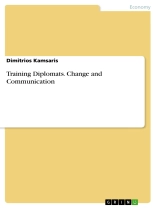Document from the year 2014 in the subject Business economics – Business Management, Corporate Governance, Euro-Business-College Bielefeld, language: English, abstract: At the present diverse days, globalization, technological revolution, economic changes and competition, create pressure on all organizations, both in private and public sector, requesting them to adapt quickly to a new changing environment. Since 1990s we observe an increased in interest in culture of international relations.
In a rapidly changing diplomatic environment, countries and organizations are facing numerous challenges leading to reformation. The main question is whether diplomats are ready and willing to accept or resist to this change. Resistance to change reconciles attitudes performed by change recipients, in order to delay or discontinue organizational change. The intention of this book is to explore the diplomats’ resistance to organizational and environmental changes in the Diplomatic Corps, by examining the resistance reasons, and the consequences on the decision-making process related to the change. The findings will contribute to better understanding of diplomat’s reactions towards changes and may be used to promote an essential dialogue in order to overcome resistance.
Globalization requires governments to operate in a context different from before, which is to integrate other participants of diplomacy in its own decision-making processes. Governments have been focusing on new strategies, such as involving ministries and non-state actors and institutions, providing greater transparency, and acting collectively as often as possible.
Undeniably, training stands at the top of organizational priorities. Many organizations believe that to survive, in this increasingly demanding world, they must effectively and efficiently utilize their most valuable asset, their diplomats’ skills. Thus, a good training program is crucial to their success. The training literature underlines the organizational and individual benefits to be gained from adopting a systematic approach to training, while the human resource development trend is to guarantee, through continuous development strategies, a continuous improvement culture. Training is an issue which its significance is well recognized by the management, the trade unions, and the governments. The growing interest in training arises by the belief that the skill level of the workforce can importantly impact performance and competitiveness, and that developing management and workforce competence is essential for organizational success.
关于作者
Professor Dimitrios P. Kamsaris is Vice President to Bilston College. He is Diplomatic Geopolitical International Corporate Foreign Investment Advisor, providing Advises on Country Branding and Corporate Training to Multinational Companies. He has been delivering academic lectures and speeches at Universities worldwide since 1990, while simultaneously, he is active business professional operating as an Advisor of Petroleum Corporations in the various countries such as:
• USA
• UK, Denmark, France, Poland, Cyprus, Bulgaria, Greece, Italy, Romania
• KSA, UAE, Kuwait, Oman, Bahrain, Qatar, Egypt
• India, Cambodia, Malaysia, Singapore, Philippines, Indonesia, Vietnam
• Tanzania. South Africa, Kenya
Also, Dr. Dimitrios Panagiotis Kamsaris is Senior Vice President of the International Institute of Marketing Professionals, Editor in Chief of the African Journal of Social Sciences and member of the Harvard Alumni.
He has experience in diplomacy, geopolitics, international business, negotiations, international trade and public relations and higher education. In the past, he had posts ranging from Sales Manager to CEO to various Multinational Companies such as Coca-Cola, Sherwin Williams, Shell and Olympic Games.
Publications:
Academic Reviewer
ACBSP Region 8, Accreditation Council for Business Schools and Programs, Middle East
OBTC, Teaching Conference for Management Educators, USA
SMA, Southern Management Association, Savannah, Georgia, USA
Editor in Chief, African Journal of Social Sciences, Africa
Books and Published Papers
2021 Diplomacy and International Business: Bonded Together
2021 Cultural Diplomacy During Epidemic Outbreaks
2020 Diplomacy: Globalization and International Relations
2020 Cultural Diplomacy: Culture as a factor affecting Diplomatic tactics
2017 Executives’ eating patterns. Health and high productivity levels
2015 The Influence of Multi-Culture Effect on Organizational Culture and Communication: Multi-Culture Effect on Corporate Culture
2014 The Brain-Net of Communication
2014 Managers’ Brain Health and the Blood Sugar Destructive Effects: Blood Sugar Effects in Decision Making
2013 Mergers in Construction Project Management, Project Management Journal
2013 Engineers’ job satisfaction within projects developed by the international construction industry in MENA region, Project Management Journal
2012 Internal Enterprise Communication and its Organizational Culture, Global Journal of Management and Research January












